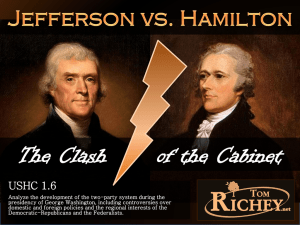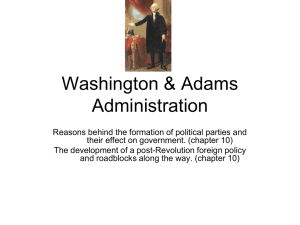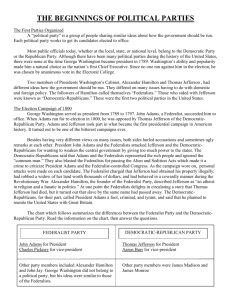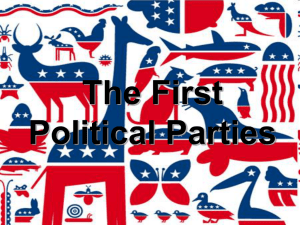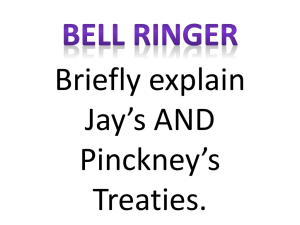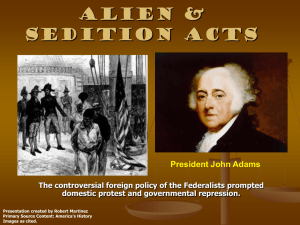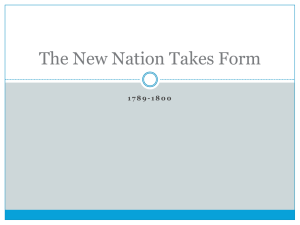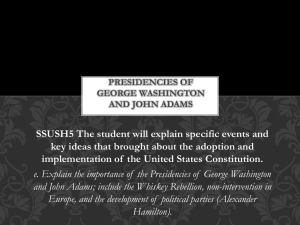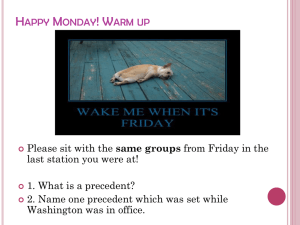Chapter 8 Section 3 The First Political Parties PowerPoint
advertisement
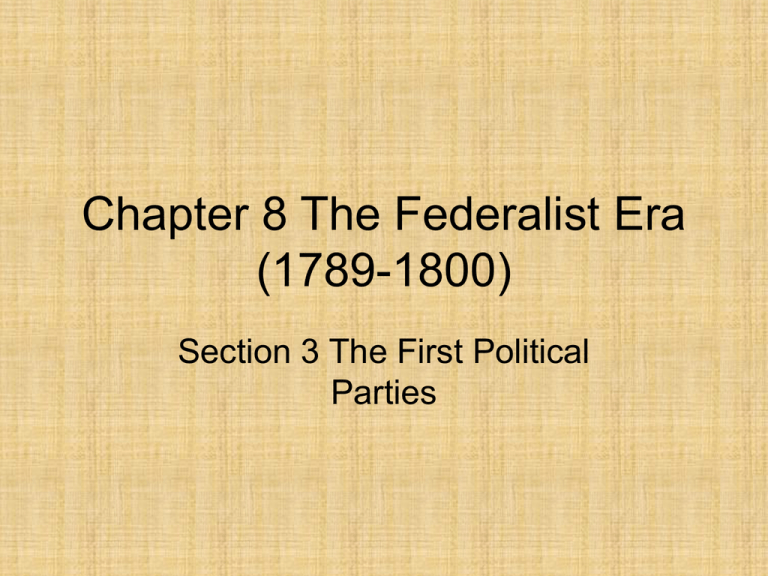
Chapter 8 The Federalist Era (1789-1800) Section 3 The First Political Parties What do you think is the most important principle of Jefferson’s Republican party? A. Strong emphasis on states’ rights 0% D A B C 0% D C D. Protection of civil liberties 0% A C. Strict interpretation of the Constitution A. B. C. 0% D. B B. Accessibility of politics to the average citizen How did the Federalist and Republican Parties form, and on what issues did they disagree? Opposing Views • Even President Washington was not liked by everyone • Many of those were supporters of Thomas Jefferson • Political Parties began to form • People disagreed with each other, even in Washington’s cabinet (Hamilton and Jefferson) • Even Washington was partisan (Favored one side of an issue) • Washington usually favored Hamilton Political Parties Emerge • Similar differences existed in Congress • Two distinct political parties formed • Federalists- supported the policies of Washington’s administration • DemocraticRepublicans (Republicans) Which of the following was NOT a United States political party? A. Democrats B. Revisionists C. Republicans D. Federalists 0% A A. B. C. 0% D. B A B C 0% D C 0% D Federalists • Stood for a strong federal government • Favored banking and shipping interests • Support in the Northeast and wealthy plantation owners of the South • 1791- Philip Freneau wrote the National Gazette that turned public opinion against the Federalist • (Jefferson, Secretary of State, helped it get started) • Jefferson and Madison later organized people who disagreed with Hamilton • Were called the DemocraticRepublicans Democratic-Republicans • “Republicans” wanted to limit the government’s power • Feared a strong federal government would endanger people’s liberties • Appealed to small farmers and urban workers • Support in the Middle Atlantic states and the South Views of the Constitution • Hamilton’s view (Fed.)- federal government had implied powers (Loose Construction) • Powers not expressly forbidden in the constitution • Hamilton used this idea to justify a national bank • Jefferson and Madison (D-R)disagreed and said there is a strict construction of the Constitution • They believed implied powers are “absolutely necessary” to carry out the expressed powers The People’s Role • Federalists supported representative government • Public office should be held by honest and educated men • Ordinary people were too likely to be swayed • Republicans feared a strong central government • Washington tried to get his two advisors (Hamilton and Jefferson) to work out their differences • They didn’t and Jefferson resigned as Secretary of State • Later Hamilton resigned as Secretary of the Treasury Election of 1796 • Federalists and Republicans held meetings called caucuses • Members of Congress and other leaders chose their parties’ candidates for office • Federalists chose John Adams for President and Charles Pickney as VP • Republicans chose Thomas Jefferson for President and Aaron Burr as VP • The electoral college votes• Adams 71, Jefferson 68 • A Federalist president and a Republican VP President Adams Problems • 1. The XYZ Affair • 2. Alien and Sedition Acts • 3. Domestic and Foreign Affairs XYZ Affair • The French started to seize American ships that carried cargo to the British • Fall of 1797- Adams sent delegates to Paris to try to resolve the dispute • The French foreign minister, Charles de Talleyrand refused to meet with the delegates • Instead he sent three agents (X,Y, and Z) who demanded a bribe and a loan for France • The Americans replied “not a sixpence” and sent a report to Adams • Adams said he would rather pay for a war and told Congress to prepare for war • This became known as the XYZ Affair Alien and Sedition Acts • Public anger rose against France, Americans became suspicious of aliens • Immigrants living in the country who were not citizens • Many Europeans who came to the US in the 1790s supported ideals of the French Revolution • Some people questioned if aliens would remain loyal if the US went to war with France • Federalists responded with strict laws to protect the nation’s security • The Alien and Sedition Acts • Sedition- Activities aimed at weakening the established government • Alien Act allowed the president to imprison aliens, or send those considered dangerous out of the country Domestic and Foreign Affairs • Republicans responded to the Alien and Sedition Acts by standing up against what they regarded as Federalist tyranny • Madison and Jefferson wrote protests that called the Virginia and Kentucky Resolutions • Said that the A&S Acts violated the Constitution • So the A&S Acts could not be put into action • The Kentucky Resolution suggested that states might nullify federal laws considered unconstitutional Which of the following is true of the Virginia and Kentucky Resolutions? A. They were drafted by Federalists opposing Republican uses of federal power. D. They rejected the principle of state’s rights. 0% 0% D 0% A B C D C C. They distributed land to settlers in Virginia and Kentucky. A 0% A. B. C. D. B B. They claimed that the Alien and Sedition Acts violated the constitution. Virginia and Kentucky Resolutions • Supported the principle of states’ rights • This states that the powers of the federal government should be limited to those clearly assigned in the Constitution • States should have all other powers not expressly forbidden to them • The issue of states’ rights would remain an important issue Adams’ Decision • To help them politically, Federalists urged Adams to declare war on France • Adams didn’t, instead appointed a new commission to seek peace with France • 1800- France agreed to a treaty • This hurt Adams chance of reelection • Hamilton and his supporters now opposed the president How did the Federalist and Republican Parties form, and on what issues did they disagree? Federalists- Strong federal government, limit ordinary people’s role in government Republicans- Limit federal government, protect individuals’ and states’ rights Chapter 8 Section 3 Quiz Which political party stood for a strong federal government? A. Federalist B. Antifederalist C. DemocraticRepublican D. Democratic D em oc ra tic D em oc n lic a ra tic -R ep ub de r nt ife A Fe de ra lis al is t t 25% 25% 25% 25% ra tic n D em oc ic a R ep ub l de r nt ife A Fe de ra lis al is t t Which party feared that a strong central government would endanger people's liberties? A. Federalist 25% 25% 25% 25% B. Antifederalist C. Republican D. Democratic The second president of the United States was A. Thomas Jefferson. B. Aaron Burr. C. John Adams. D. Charles Pinckney. y. ne rle s Pi nc k da m s. hn A B ha ar on A Jo C Th om as Je ffe rs on . ur r. 25% 25% 25% 25% tu ck . .. Ac t n en di tio an d K Se w e Vi rg in ia ac pe po lit i ith ca l pa Fr an c rti e e s Which of the following proposed a challenge to the constitutional authority of the national government? A. political parties 25% 25% 25% 25% B. peace with France C. Sedition Act D. Virginia and Kentucky Resolutions What divided the Federalists and hurt John Adams's chance for reelection? states' rights treaty with France Neutrality Act war with France Fr an ce ith tra l w ar w eu N ith w ty tr ea ity Fr an ce ts ig h ;r 39 &# 0 at es Ac t 25% 25% 25% 25% st A. B. C. D. Participant Scores 0 0 Participant 1 Participant 2 0 0 0 Participant 3 Participant 4 Participant 5 Team Scores 0 0 Team 1 Team 2 0 0 0 Team 3 Team 4 Team 5


